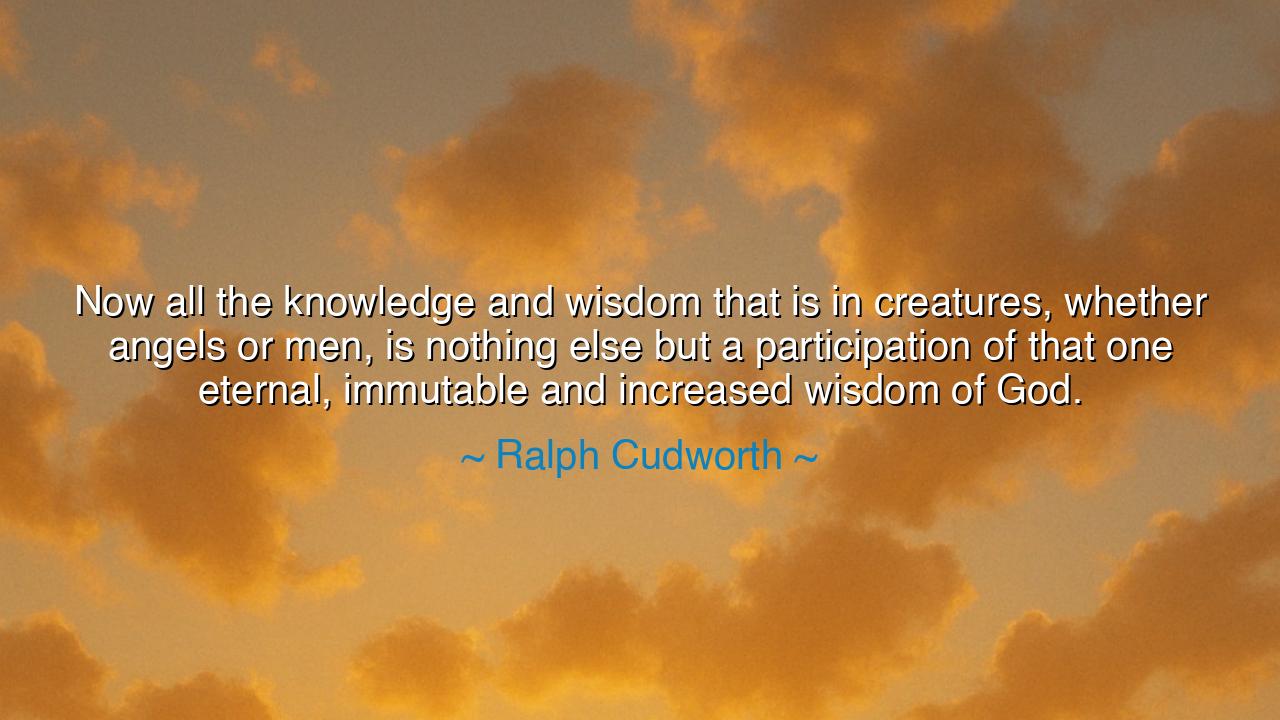
Now all the knowledge and wisdom that is in creatures, whether
Now all the knowledge and wisdom that is in creatures, whether angels or men, is nothing else but a participation of that one eternal, immutable and increased wisdom of God.






“Now all the knowledge and wisdom that is in creatures, whether angels or men, is nothing else but a participation of that one eternal, immutable and increased wisdom of God.”
Thus wrote Ralph Cudworth, a philosopher of divine reason and one of the great thinkers of the Cambridge Platonists in seventeenth-century England. His words shine with a light older than his age — a light that reaches back to Plato, to the prophets, to the mystics who saw in all creation the reflection of the divine mind. In this single sentence, he unfolds a truth vast and humbling: that all knowledge and all wisdom, wherever found — in the minds of men, in the hearts of angels, in the order of the stars — are but reflections of the eternal wisdom of God. What we know is not our possession, but our participation; not invention, but communion with the infinite mind that holds all truth.
When Cudworth speaks of “creatures, whether angels or men,” he places all beings — heavenly and earthly — under the same great law of dependence. For even the most radiant angel and the wisest philosopher are but vessels of a light that is not their own. The flame of understanding that burns in the soul is a spark drawn from an eternal fire. To claim knowledge as our own is like mistaking the reflection of the sun in a pond for the sun itself. Wisdom belongs to God, immutable and perfect, and all that lives and thinks shares in it only by His grace. Thus, every act of knowing, every flash of insight, every work of beauty is, at its heart, an act of participation in the divine — a communion between the finite and the infinite.
The origin of this teaching lies in Cudworth’s faith and philosophy. Living in an age of turmoil — when religion was torn by conflict and science was rising in strength — he sought to reconcile reason with revelation, intellect with spirit. The Cambridge Platonists believed that truth was one and indivisible, that the light of reason and the light of faith both flowed from the same divine source. To them, God was not a distant ruler but the living mind that sustains all things. Thus, to know truth was not merely to learn facts, but to draw nearer to the divine nature itself. Cudworth’s words are therefore both philosophical and devotional — they call the scholar to humility and the believer to awe.
To understand his meaning more deeply, consider the example of Isaac Newton, Cudworth’s younger contemporary, who gazed upon the cosmos with the eyes of reason and wonder. When Newton discovered the laws of motion and gravitation, he did not boast of creating truth; he said he had merely “thought God’s thoughts after Him.” His science was not rebellion against heaven, but reverence — a recognition that every law written in nature is but a line of the divine script. Newton’s discoveries stand as proof of Cudworth’s teaching: that when the human mind truly understands, it participates in the eternal mind that orders the universe. Knowledge, then, is not pride’s achievement but grace received.
Cudworth’s vision also speaks to the moral life. If all wisdom is participation in God’s wisdom, then to act wisely is to act in harmony with the divine order; to act foolishly is to separate oneself from it. The pride of self-derived understanding leads only to confusion and darkness, for it severs the soul from its source. But humility opens the way for illumination. The wise man does not claim to be the light — he stands within it. He learns, he listens, he contemplates, knowing that every truth he discovers is a gift from a wisdom greater than his own. Thus, true learning demands reverence, and true power demands gratitude.
There is a great comfort in this truth. For if all knowledge and wisdom belong to God, then the universe is not chaos but order, not blindness but purpose. Every creature, every star, every human mind, plays its part in the unfolding of divine intelligence. We may stumble in our search for understanding, but even our striving is guided by the light we borrow. The poet, the scientist, the saint — all are students of the same eternal Teacher. And when their works endure, it is because they echo something immutable, something beyond themselves — a truth that time cannot erode because it belongs not to man, but to God’s eternal reason.
Therefore, O seeker of truth, take this lesson to heart: you are not the source, but the vessel of wisdom. Do not boast of knowledge as if you had created it, but cherish it as a sacred trust. When you learn, do so with reverence; when you teach, do so with humility; when you create, do so with gratitude to the One whose thought you reflect. Strive always to align your mind with the eternal mind, your will with the divine order. For in doing so, you fulfill your highest calling — to become, in your measure, a mirror of that unchanging wisdom which moves the stars, inspires the prophets, and breathes life into all creation.
And when at last your striving is done, and your own understanding fades like twilight into night, know this: the light of truth you have touched, however briefly, was not yours to lose. It was — and ever shall be — the eternal wisdom of God, in whom all knowledge begins, through whom all reason endures, and toward whom every mind, whether of angels or men, forever turns in wonder.






AAdministratorAdministrator
Welcome, honored guests. Please leave a comment, we will respond soon